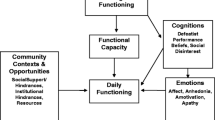Abstract
Individuals with Serious mental illness require psychosocial treatments as adjunct to pharmacotherapy to promote recovery. An ACT team was trained in CBT interventions and charts were reviewed to identify sessions where CBT was utilized. Subjects who received at least 3 sessions of CBT went from 10% before training to 44% after training and 54% in the follow up period. All team members including bachelor’s level staff provided CBT interventions. Results show that ACT Team members including those at bachelor’s level can be trained in CBT and they utilize these interventions after training is completed.
Similar content being viewed by others
References
Barkham, M., Shapiro, D. A., et al. (1999). Psychotherapy in two-plus-one sessions: Outcomes of a randomized controlled trial of cognitive-behavioral and psychodynamic-interpersonal therapy for subsyndromal depression. Journal of Consulting and Clinical Psychology, 67, 210–211.
Blackburn, I. M., James, I. A., et al. (2001). The revised cognitive therapy scale (CTS-R): Psychometric properties. Behavioural and cognitive psychotherapy, 29, 431–446.
Clark, R. E., & Samnaliev, M. (2005). Psychosocial treatment in the 21st century. International Journal of Law and Psychiatry, 28(5), 532–544.
Corrigan, P. W., Mueser, K. T., Bond, G. R., Drake, R. E., & Solomon, P. (2008). Principles and practice of psychiatric rehabilitation. The Guildford Press: New York.
Cunningham, R. (2002). Living with schizophrenia and thriving in remission: 10 years of stress and crises. Brief Treatment and Crisis Intervention, 2, 247–260.
Dilk, M. N., & Bond, G. R. (1996). Meta-analytic evaluation of skills training research for individuals with severe mental illness. Journal of Consulting and Clinical Psychology, 64(6), 1337–1346.
Drake, R. E., Merrens, M. R., & Lynde, D. W. (2005). Evidenced based mental health practice: A textbook. Norton and Company: New York.
Lehman, A. F., & Steinwachs, D. M. (2003). Evidence-based psychosocial treatment practices in schizophrenia: Lessons from the patient outcomes research team (PORT) project. The journal of the American Academy of Psychoanalysis and Dynamic Psychiatry, 31(1), 141–154.
NACM (1997). Technical assistance collaborative (1996): Managed care: Case management, care management roles and responsibilities. Boston, MA, p. 87.
NICE (2008). Schizophrenia: Core interventions in the treatment and management of schizophrenia in adults in primary and secondary care.
(NFCMH), P. s. N. f. c. o. m. h. (2003). Achieving the promise: Transforming the mental health care in America. Rockville,MD. DHSS Publication No. SMA-03-3832.
Patterson, T. L., & Leeuwenkamp, O. R. (2008). Adjunctive psychosocial therapies for the treatment of schizophrenia. Schizophrenia Research, 100(1–3), 108–119.
Pilling, S., Bebbington, P., Kuipers, E., Garety, P., Geddes, J., Martindale, B., et al. (2002). Psychological treatments in schizophrenia: I. Meta-analysis of family intervention and cognitive behaviour therapy. Psychological Medicine, 32, 763–782.
Rosen, A., Mueser, K. T., et al. (2007). Assertive community treatment-Issues from scientific and clinical literature with implications for practice. Journal of Rehabilitation Research and Development, 44(6), 813–826.
Salyers, M. P., & Tsemberis, S. (2007). ACT and recovery: Integrating evidence-based practice and recovery orientation on assertive community treatment teams. Community Mental Health Journal, 43(6), 619–641.
Turkington, D., Kingdon, D., et al. (2002). Effectiveness of a brief cognitive-behavioural therapy intervention in the treatment of schizophrenia. British Journal of Psychiatry, 180, 523–527.
WHO. (1999). World Health Organization. World health report 1999: making a difference. From Available at: http://www.who.int/whr/1999/en/index.html.
Wykes, T., Steel, C., et al. (2008). Cognitive behavior therapy for schizophrenia: Effect sizes, clinical models, and methodological rigor. Schizophrenia Bulletin, 34(3), 523–537.
Acknowledgments
The authors thank SBCS Inc for access to data, Crystal Scaffidi for helping in data collection and Faith Dickerson for her review of the manuscript and critical comments.
Author information
Authors and Affiliations
Corresponding author
Rights and permissions
About this article
Cite this article
Pinninti, N.R., Fisher, J., Thompson, K. et al. Feasibility and Usefulness of Training Assertive Community Treatment Team in Cognitive Behavioral Therapy. Community Ment Health J 46, 337–341 (2010). https://doi.org/10.1007/s10597-009-9271-y
Received:
Accepted:
Published:
Issue Date:
DOI: https://doi.org/10.1007/s10597-009-9271-y




